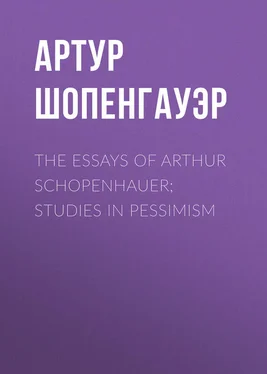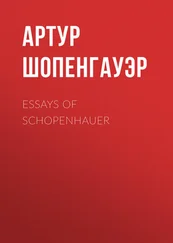Артур Шопенгауэр - The Essays of Arthur Schopenhauer; Studies in Pessimism
Здесь есть возможность читать онлайн «Артур Шопенгауэр - The Essays of Arthur Schopenhauer; Studies in Pessimism» — ознакомительный отрывок электронной книги совершенно бесплатно, а после прочтения отрывка купить полную версию. В некоторых случаях можно слушать аудио, скачать через торрент в формате fb2 и присутствует краткое содержание. Жанр: Философия, literature_19, foreign_antique, foreign_prose, на английском языке. Описание произведения, (предисловие) а так же отзывы посетителей доступны на портале библиотеки ЛибКат.
- Название:The Essays of Arthur Schopenhauer; Studies in Pessimism
- Автор:
- Жанр:
- Год:неизвестен
- ISBN:нет данных
- Рейтинг книги:4 / 5. Голосов: 1
-
Избранное:Добавить в избранное
- Отзывы:
-
Ваша оценка:
- 80
- 1
- 2
- 3
- 4
- 5
The Essays of Arthur Schopenhauer; Studies in Pessimism: краткое содержание, описание и аннотация
Предлагаем к чтению аннотацию, описание, краткое содержание или предисловие (зависит от того, что написал сам автор книги «The Essays of Arthur Schopenhauer; Studies in Pessimism»). Если вы не нашли необходимую информацию о книге — напишите в комментариях, мы постараемся отыскать её.
The Essays of Arthur Schopenhauer; Studies in Pessimism — читать онлайн ознакомительный отрывок
Ниже представлен текст книги, разбитый по страницам. Система сохранения места последней прочитанной страницы, позволяет с удобством читать онлайн бесплатно книгу «The Essays of Arthur Schopenhauer; Studies in Pessimism», без необходимости каждый раз заново искать на чём Вы остановились. Поставьте закладку, и сможете в любой момент перейти на страницу, на которой закончили чтение.
Интервал:
Закладка:
Arthur Schopenhauer
The Essays of Arthur Schopenhauer; Studies in Pessimism
NOTE
The Essays here presented form a further selection from Schopenhauer's Parerga , brought together under a title which is not to be found in the original, and does not claim to apply to every chapter in the volume. The first essay is, in the main, a rendering of the philosopher's remarks under the heading of Nachträge zur Lehre vom Leiden der Welt , together with certain parts of another section entitled Nachträge zur Lehre von der Bejahung und Verneinung des Willens zum Leben . Such omissions as I have made are directed chiefly by the desire to avoid repeating arguments already familiar to readers of the other volumes in this series. The Dialogue on Immortality sums up views expressed at length in the philosopher's chief work, and treated again in the Parerga . The Psychological Observations in this and the previous volume practically exhaust the chapter of the original which bears this title.
The essay on Women must not be taken in jest. It expresses Schopenhauer's serious convictions; and, as a penetrating observer of the faults of humanity, he may be allowed a hearing on a question which is just now receiving a good deal of attention among us.
T.B.S.
ON THE SUFFERINGS OF THE WORLD
Unless suffering is the direct and immediate object of life, our existence must entirely fail of its aim. It is absurd to look upon the enormous amount of pain that abounds everywhere in the world, and originates in needs and necessities inseparable from life itself, as serving no purpose at all and the result of mere chance. Each separate misfortune, as it comes, seems, no doubt, to be something exceptional; but misfortune in general is the rule.
I know of no greater absurdity than that propounded by most systems of philosophy in declaring evil to be negative in its character. Evil is just what is positive; it makes its own existence felt. Leibnitz is particularly concerned to defend this absurdity; and he seeks to strengthen his position by using a palpable and paltry sophism. 1 1 Translator's Note , cf. Thèod , § 153. – Leibnitz argued that evil is a negative quality — i. e ., the absence of good; and that its active and seemingly positive character is an incidental and not an essential part of its nature. Cold, he said, is only the absence of the power of heat, and the active power of expansion in freezing water is an incidental and not an essential part of the nature of cold. The fact is, that the power of expansion in freezing water is really an increase of repulsion amongst its molecules; and Schopenhauer is quite right in calling the whole argument a sophism.
It is the good which is negative; in other words, happiness and satisfaction always imply some desire fulfilled, some state of pain brought to an end.
This explains the fact that we generally find pleasure to be not nearly so pleasant as we expected, and pain very much more painful.
The pleasure in this world, it has been said, outweighs the pain; or, at any rate, there is an even balance between the two. If the reader wishes to see shortly whether this statement is true, let him compare the respective feelings of two animals, one of which is engaged in eating the other.
The best consolation in misfortune or affliction of any kind will be the thought of other people who are in a still worse plight than yourself; and this is a form of consolation open to every one. But what an awful fate this means for mankind as a whole!
We are like lambs in a field, disporting themselves under the eye of the butcher, who chooses out first one and then another for his prey. So it is that in our good days we are all unconscious of the evil Fate may have presently in store for us – sickness, poverty, mutilation, loss of sight or reason.
No little part of the torment of existence lies in this, that Time is continually pressing upon us, never letting us take breath, but always coming after us, like a taskmaster with a whip. If at any moment Time stays his hand, it is only when we are delivered over to the misery of boredom.
But misfortune has its uses; for, as our bodily frame would burst asunder if the pressure of the atmosphere was removed, so, if the lives of men were relieved of all need, hardship and adversity; if everything they took in hand were successful, they would be so swollen with arrogance that, though they might not burst, they would present the spectacle of unbridled folly – nay, they would go mad. And I may say, further, that a certain amount of care or pain or trouble is necessary for every man at all times. A ship without ballast is unstable and will not go straight.
Certain it is that work, worry, labor and trouble , form the lot of almost all men their whole life long. But if all wishes were fulfilled as soon as they arose, how would men occupy their lives? what would they do with their time? If the world were a paradise of luxury and ease, a land flowing with milk and honey, where every Jack obtained his Jill at once and without any difficulty, men would either die of boredom or hang themselves; or there would be wars, massacres, and murders; so that in the end mankind would inflict more suffering on itself than it has now to accept at the hands of Nature.
In early youth, as we contemplate our coming life, we are like children in a theatre before the curtain is raised, sitting there in high spirits and eagerly waiting for the play to begin. It is a blessing that we do not know what is really going to happen. Could we foresee it, there are times when children might seem like innocent prisoners, condemned, not to death, but to life, and as yet all unconscious of what their sentence means. Nevertheless, every man desires to reach old age; in other words, a state of life of which it may be said: "It is bad to-day, and it will be worse to-morrow; and so on till the worst of all."
If you try to imagine, as nearly as you can, what an amount of misery, pain and suffering of every kind the sun shines upon in its course, you will admit that it would be much better if, on the earth as little as on the moon, the sun were able to call forth the phenomena of life; and if, here as there, the surface were still in a crystalline state.
Again, you may look upon life as an unprofitable episode, disturbing the blessed calm of non-existence. And, in any case, even though things have gone with you tolerably well, the longer you live the more clearly you will feel that, on the whole, life is a disappointment, nay, a cheat .
If two men who were friends in their youth meet again when they are old, after being separated for a life-time, the chief feeling they will have at the sight of each other will be one of complete disappointment at life as a whole; because their thoughts will be carried back to that earlier time when life seemed so fair as it lay spread out before them in the rosy light of dawn, promised so much – and then performed so little. This feeling will so completely predominate over every other that they will not even consider it necessary to give it words; but on either side it will be silently assumed, and form the ground-work of all they have to talk about.
He who lives to see two or three generations is like a man who sits some time in the conjurer's booth at a fair, and witnesses the performance twice or thrice in succession. The tricks were meant to be seen only once; and when they are no longer a novelty and cease to deceive, their effect is gone.
While no man is much to be envied for his lot, there are countless numbers whose fate is to be deplored.
Life is a task to be done. It is a fine thing to say defunctus est ; it means that the man has done his task.
Читать дальшеИнтервал:
Закладка:
Похожие книги на «The Essays of Arthur Schopenhauer; Studies in Pessimism»
Представляем Вашему вниманию похожие книги на «The Essays of Arthur Schopenhauer; Studies in Pessimism» списком для выбора. Мы отобрали схожую по названию и смыслу литературу в надежде предоставить читателям больше вариантов отыскать новые, интересные, ещё непрочитанные произведения.
Обсуждение, отзывы о книге «The Essays of Arthur Schopenhauer; Studies in Pessimism» и просто собственные мнения читателей. Оставьте ваши комментарии, напишите, что Вы думаете о произведении, его смысле или главных героях. Укажите что конкретно понравилось, а что нет, и почему Вы так считаете.












